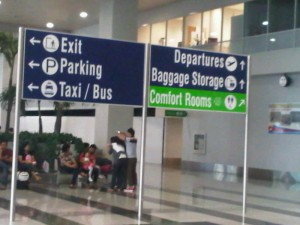MANILA, Philippines—The government has finally sealed a P1.9-billion deal with Japanese contractor Takenaka Corp. to make Ninoy Aquino International Airport (Naia) Terminal 3 fully operational next year but the rehabilitation itself could take longer than initially expected.
In a statement, the Department of Transportation and Communications (DOTC) on Saturday said it had “reached an agreement” with Takenaka with an eye toward having Terminal 3 fully operational by August 2014.
This timetable was pushed back from the original target to complete the project by the first quarter of 2014.
“We just put a little buffer for contingency,” Transport Secretary Joseph Abaya said in a text message.
Under the terms of the agreement, Takenaka will complete the work within 12 months, the DOTC said. These include the baggage handling, flight information display, computer terminal, gate coordination and fire protection systems.
Naia Terminal 3 is currently operating at half its annual capacity of 13 million passengers due to certain structural issues. These issues are what Takenaka would address.
“The full operation of Terminal 3 will allow for a faster and more pleasant experience for passengers flying in and out of Manila,” the DOTC said in the statement.
Terminal 3 is the newest facility in the country’s busiest international airport. The Naia terminals are the main gateway to Metro Manila and are projected to serve a total of 34 million passengers this year, the Manila International Airport Authority said last month.
Terminal 3 opened in 2008 after being mothballed for six years.
It failed to open in 2002 after the Philippine government under President Gloria Macapagal-Arroyo alleged that the contract with Philippine International Airport Terminal Co. (Piatco), the consortium that won the right to build the terminal during the Ramos administration, was riddled with irregularities.
Takenaka was hired by Piatco as a subcontractor for Terminal 3.
Further delays to the rehabilitation of the terminal were caused by years of litigation between the Philippine government and Piatco and the latter’s German shareholder Fraport AG.
Fraport still has a pending arbitration case against the Philippine government before the World Bank’s International Center for Settlement of Investment Disputes in Washington DC in the United States.



